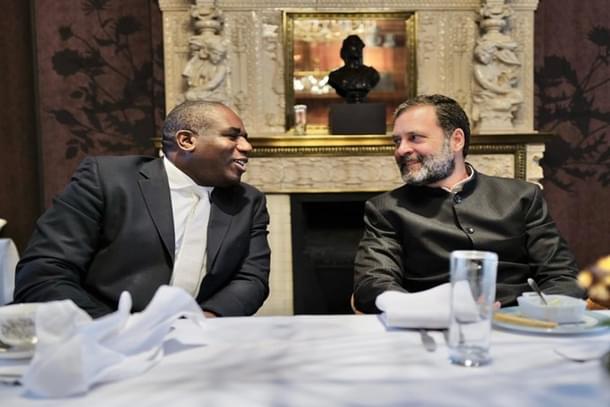Politics
Days After Meeting Rahul Gandhi, Labour Shadow Foreign Secretary Tries To 'Play Neutral' Between Khalistan-Supporters And India
Swarajya Staff
Mar 21, 2023, 04:35 PM | Updated 04:37 PM IST
Save & read from anywhere!
Bookmark stories for easy access on any device or the Swarajya app.


On 19 March, a mob of Khalistani sympathisers attacked the Indian High Commission in London. The protestors pelted stones and disrespected the Indian tricolour.
The incident occurred soon after the Punjab police and security agencies launched an operation to arrest a self-styled preacher and Khalistan supporter, Amritpal Singh Sandhu, and his associates.
India's Ministry of Foreign Affairs responded firmly to the lack of security around the Indian High Commission. What is said to have enraged the Indian government even more is the perceived indifference of the British authorities, despite India informing and warning them about such protests well in advance.
As a response to the incident at the High Commission, some UK parliamentarians acknowledged their inability to prevent the aggressive Khalistan-supporting mob from attacking the Indian embassy on British soil.
However, certain members of Parliament, primarily from the Labour Party, attempted to 'play neutral' between the Indian government and the Khalistan sympathisers.
Among them was Shadow Foreign Secretary, David Lammy, who tweeted, "Labour completely condemns the unacceptable disorder and vandalism at the Indian High Commission today. This situation needs calm. Ministers should engage with Indian authorities so UK families who can't reach their relatives in Punjab regain contact as soon as possible."
This tweet, while condemning the "disorder and vandalism" at the Indian High Commission, did not name the perpetrators of the vandalism.
It also innocuously called for "calm" — a phrase generally used to broker peace between two parties attacking each other. In this case, it effectively implied that the Indian government was engaging in unwarranted or excessive actions.
Lammy also added that UK families were struggling to contact relatives in Punjab, creating a bleak image of the situation in the state.
In this he was joined by other Labour MPs of Sikh heritage, Tanmanjeet Singh Dhesi and Preet Kaur Gill, who made similar claims about the Indian government suppressing the civil liberties of Punjab's people.
An observer unaware of the going-ons in India and Punjab would almost think that the Labour MPs were describing an 'occupied territory' when talking about Punjab.
In their tweets, the MPs expressed worries about UK families being unable to reach their loved ones in Punjab because of an “internet blackout”.
However, in reality, only mobile internet and SMS services were shut down, that too in selected districts. Voice calls as well as other network services were active.
Lammy's guest in London
Some days ago, on 6 March, Lammy was seen with Congress leader Rahul Gandhi during the latter's London tour.
While in London, Gandhi actively attempted to portray Indian democracy as under constant threat. At a presentation he gave at Cambridge University, he questioned a turban-wearing Sikh youth about whether “he was from India", and then went on to say that 'Mr Narendra Modi thinks that he is a second-class citizen".
Gandhi’s meeting with the Labour MP and Shadow Foreign Secretary in early March, and Lammy's recent tweet, makes one wary of the kind of information he was fed when Gandhi came visiting.
It is concerning that barely days after Rahul Gandhi said that US and Europe are not doing enough to save democracy in India, some elected representatives of UK try to portray a distorted image of events taking place here and indirectly legitimise the Khalistan cause.
This type of narrative could not only endanger the safety and security of Indian personnel and assets in other countries, it could also contribute to giving global legitimacy to an ideology that has brought much misery to countless Indians in the past.




